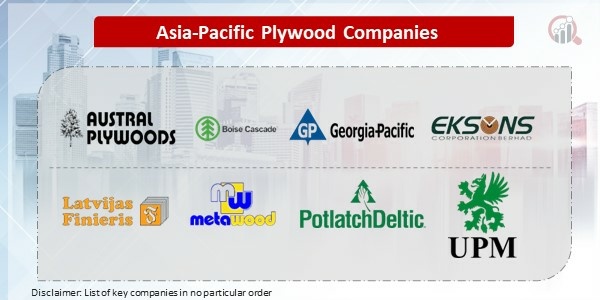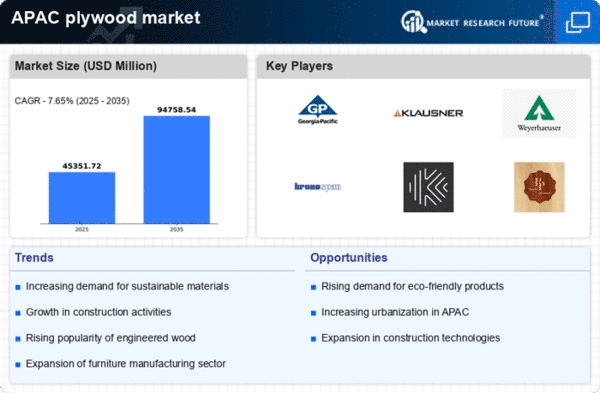Top Industry Leaders in the Asia Pacific Plywood Market

Asia-Pacific Plywood Market
The Asia-Pacific Plywood market is thriving due to rapid urbanization and infrastructural development in the region. Plywood finds extensive usage in construction and furniture manufacturing, bolstering market expansion.
Strategies for Market Share Gain:
The competitive landscape of the Asia-Pacific plywood market is characterized by several key strategies adopted by leading players:
-
Focus on Product Innovation: Manufacturers are constantly innovating to meet evolving customer needs. This includes developing eco-friendly plywoods using sustainable practices and incorporating fire-resistant or waterproof properties for specific applications. -
Expansion and Capacity Building: Established players are expanding their production capacities to cater to the growing demand. This involves setting up new manufacturing units or acquiring existing ones, particularly in countries with abundant raw material resources. -
Brand Building and Distribution Network: Strong brand recognition and a robust distribution network are crucial for success. Leading companies invest heavily in brand marketing and establish partnerships with distributors and retailers across the region. -
Cost Optimization and Efficiency: Plywood manufacturers are constantly optimizing their operations to reduce production costs and improve efficiency. This can involve automation of processes, adoption of lean manufacturing principles, and sourcing raw materials strategically. -
Mergers and Acquisitions: Consolidation is a trend in the market, with established players acquiring smaller companies to expand their market reach and product portfolio.
Factors Affecting Market Share:
Several factors influence market share in the Asia-Pacific plywood market:
-
Product Quality and Consistency: Customers prioritize high-quality plywood with consistent properties for durability and performance. Companies with a strong reputation for quality gain a competitive edge. -
Price Competitiveness: Plywood is a cost-sensitive product, particularly in developing economies. Companies that offer competitive pricing strategies without compromising on quality attract a wider customer base. -
Customer Service and After-Sales Support: Responsive customer service and reliable after-sales support build customer loyalty and brand trust, leading to repeat business. -
Compliance with Regulations: Plywood manufacturers need to comply with stringent regulations regarding formaldehyde emissions and wood sourcing practices. Companies with a strong commitment to sustainability gain favor with environmentally conscious consumers.
Key Companies in the Plywood market include
- Austal Plywoods Private Limited
- Boise Cascade Company
- Georgia Pacific LLC
- Eksons Corporation Berhad
- Latvijas Fineries AS
- Metas Wood
- Potlatch Deltic Corporation
- SVEZA Forest
- UPM Kymmene Oyj
- Weyerhaeuser Company Limited
Recent Developments
August 2023: Greenply Industries, a leading Indian plywood manufacturer, announced a new manufacturing facility in Malaysia to cater to the growing Southeast Asian market
September 2023: Greenply partnered with commercial star N.T. Rama Rao Jr. for its new TVC. This partnership had set a higher benchmark for the company, a trendsetter in advertising within the wood panel industry, marking another milestone.
May 2023: Hood Industries announced the construction of a new laminated plywood facility in Beaumont, slightly over a year after an EF-2 tornado tore through the town, destroying the plywood manufacturing plant that had been operational for 40 years.
In February 2021, West Fraser, a Canadian plywood manufacturer, bought Norbord for an undisclosed amount of money. This acquisition makes a lot of sense and joins two top-notch teams of employees who manufacture green products necessary in a low carbon economy, which will put West Fraser in a good position in the future and marks an era change for all the West Fraser company employees and shareholders upon completion of the Norbord transaction.

